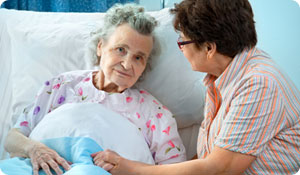
For many people with health problems, a hospital is not the ideal setting. Perhaps the patient did spend time in a hospital but has recovered sufficiently to be discharged. Or maybe an elderly person has developed various medical needs that can be met in his or her home.
But what kind of help is needed, and who is the best caregiver for a particular situation? Do you need a nurse or can you get by with someone with less formal training? Here's a rundown of different types of healthcare providers you may encounter:
Virtual Nurse
Although still in clinical trials at Boston's Northeastern University, a virtual nurse may one day arrive at a hospital near you. Developed to counsel patients just prior to discharge, the virtual nurse is delivered to the patient's bedside in animated, interactive touch screen form. She offers detailed instructions for follow-up care including medications and subsequent appointments. So far, results are promising, with participants reporting that the virtual nurse is easy to understand and even preferable to a live nurse.
Visiting Nurse
A visiting nurse is a registered nurse who takes care of people in their homes. She treats people recovering from illnesses and accidents as well as those who are disabled or chronically ill. She will also administer medication and help with all the basic tasks of daily living. Visiting nurses operate out of social-service agencies that serve the local community. Most states have visiting nurse associations. Check http://vnaa.org for local listings.
Home Health Aides or Certified Nurse's Aides
These caregivers provide crucial help for homebound patients under the supervision of nurses and physical therapists. Some training is required, although this varies from state to state. Generally, HHAs and CNAs will help patients get to and from the bathroom, groom themselves, take medications, eat and drink, and monitor vital signs such as blood pressure. Some aides also do light housekeeping. Depending on their training and individual state requirements, they may also treat wounds, administer dressings, and handle catheters and ostomies.
Personal Care Aides
These assistants are not certified but nevertheless can be invaluable members of a care team. They may help keep house, prepare meals, and provide companionship. As with certified aides, different states have very different variations in job titles and duties.
Sources:
Home Care Files
www.homecarefiles.org
Visiting Nurse Associations of America
www.vnaa.org
Northeastern University
www.northeastern.edu





